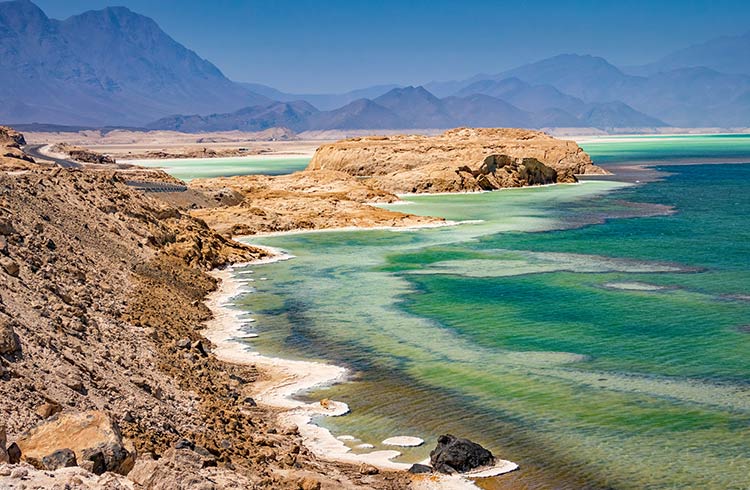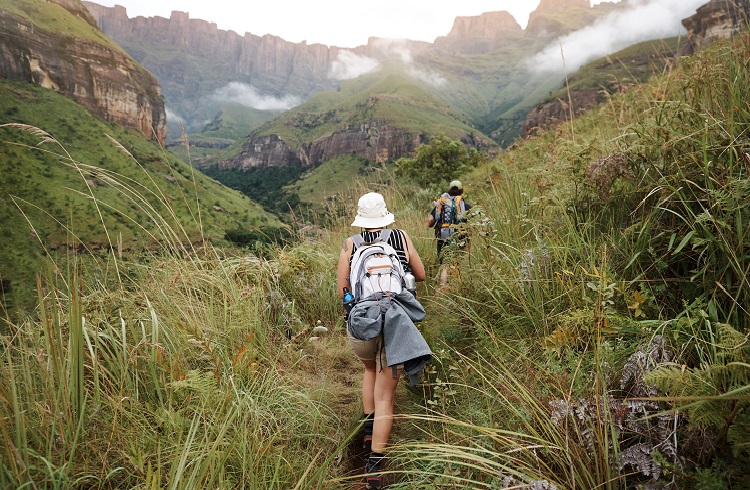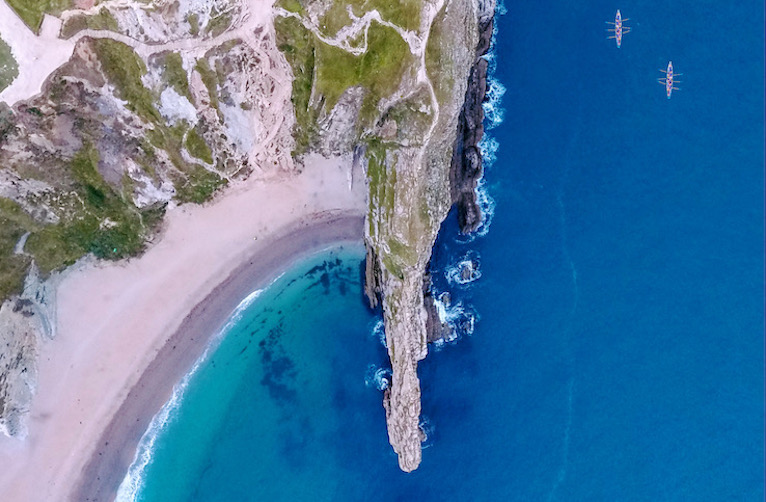Is Djibouti Safe For Travelers? 11 Essential Safety Tips
Djibouti is one of the safer countries located on the Horn of Africa. Here's everything you need to know to stay safe while traveling here.
 Photo © Getty Images/benedek
Photo © Getty Images/benedek
Lake Abbe is one of the most famous attractions in Djibouti, a salt lake situated on the border with Ethiopia and one of a chain of six connected lakes in Africa. Travelers journey 95mi (154km) to Lake Abbe to see the 50m limestone chimneys, the pink flamingos, the salt flats, the incredible sunrises and to see where the last scene of Planet of the Apes (the original 1968 version) was filmed.
Except, it wasn't filmed here. The film set story is widespread, but is probably a concoction of some local entrepreneur who's been cashing-in on tourists ever since.
The 'Statue of Liberty buried in the sand' scene was shot on the eastern end of Westward Beach, Malibu, California. Sorry to burst your Planet Of The Apes knowledge bubble, but the 'forbidden zone' was also not filmed in Djibouti, go to Horseshoe Bend in Arizona's Glen Canyon for that.
Still, there's always the pink flamingos and limestone chimneys, just don't drink the lake water at Lake Abbe or Lake Assal – it's poisonous.
1. Crime in Djibouti
In general crime levels in Djibouti are relatively low, and not just in comparison to some of its immediate neighbors (think Somalia and Eritrea). That's not to say that the country is crime free, so you should always use your common sense and be particularly alert for pickpockets and theft in general.
There have also been some reports of occasional banditry outside the capital, Djibouti City.
For the best bet at staying safe (as you would anywhere else in the world), avoid traveling alone to isolated places, particularly coastal areas like Dorale and Khor Ambado – which are very isolated. As always, walking around after dark on your own is not safe.
2. Natural hazards in Djibouti
Djibouti has an incredible landscape, from volcanoes to craters, salt lakes to plateaus. However, its beauty hasn't come without cost. The country is renowned for its seismic activity and scientists are predicting that over time (millions of years) Djibouti will disappear into the ocean, having finally been pulled apart by the African, Somali and Arabian tectonic plates which are separating at about 2cm each year.
The general rule of thumb for earthquake safety is to drop, cover and hold on. So, drop to the ground; take cover and hold onto something solid until the shaking stops.
3. Respect the local culture and religion
Being a predominantly Muslim nation, Djibouti is fairly conservative, but not restrictively so. Be respectful of local culture and dress conservatively, especially in rural areas.
Be particularly aware of the restrictions and customs during Ramadan. If in doubt, ask a local for advice.
Throughout Djibouti the leafy narcotic, khat, is widely chewed, and while it's legal in Djibouti it is not elsewhere, so don't even think about stashing a bit to show your mates at home. Strangely, chewing narcotic weed and drinking are both legal, but public displays of drunkenness can result in a two year prison term – so watch your intake of booze in Djibouti.
Same-sex sexual activity is legal, but anti-discrimination laws are not in place. If you're an LGBTQ+ traveler in Djibouti, keep public displays of affection to a minimum.
Photographing public infrastructure (including but not limited to public buildings, seaports, the airport, bridges, military facilities or personnel). If caught, your photographic equipment will be confiscated and you risk being arrested.
Be aware of the drone laws before operating one in the country.
Hunting is also forbidden by law.
4. Cash vs cards in Djibouti
There are only a limited number of ATMs available in Djibouti City, but be aware that Djibouti is a cash economy and credit cards are not widely accepted. Changing money on the street is legal, and be aware of possible scams as well as personal safety considerations if someone is observing you while you carry large amounts of cash. The exchange rate on the street will be similar to that at a bank or hotel.
5. Health issues
Like many places around the world, Malaria and Dengue Fever are prevalent in Djibouti. Travelers who become ill with a fever or flu-like symptoms while traveling or up to one year after returning home should seek prompt medical attention, and tell the physician their travel history and what anti-malarial drugs they have been taking.
Despite polio outbreaks in all of Djibouti's neighbors (Somalia, Ethiopia, Eritrea and Yemen), there has not been a case of polio since 1999 in the country. In 2018 Djibouti’s Ministry of Health carried out a polio National Immunization Day, and plan to do so again in 2019. Tuberculosis is also an increasingly serious health concern in Djibouti.
In May 2006 avian influenza was confirmed in three chickens and one human in Djibouti. In an effort to combat the virus, immigration authorities at Ambouli International Airport take travelers' temperature before they enter the country. Be aware these checks might operate, if there is another outbreak of the flu in the country.
6. Vaccinations for Djibouti
You should consider the following vaccinations before traveling to Djibouti:
- Hepatitis A and B
- Typhoid
- Meningococcus
- Rabies
- Revaccination / booster shots for Measles, Mumps and Rubella and Tetanus-Diptheria
7. Getting around Djibouti safely
While crime isn't such a problem in Djibouti, getting around via local transport might be. While the country has been declared a "mine-safe" country, this only indicates that landmines have been identified and marked, not that they have been removed.
Landmines are prevalent in the northern districts of Tadjoura and Obock, and the southern district of Ali Sabieh.
In addition, there may be mines in the Ali Sabieh area of the south.
Travelers should stay on paved roads and should check with local authorities before using unpaved roads or any area off the beaten track so to speak.
8. Road quality in Djibouti
Roads in Djibouti are not of a good standard. They are often narrow, poorly lit and badly maintained. Roaming livestock are an additional hazard. The standard of driving and vehicle maintenance is generally poor.
Driving at night is extremely dangerous and strongly discouraged on all roads outside Djibouti City.
As if the roads aren't bad enough; minibuses and cars often break down and when breakdowns occur, local drivers usually place branches or rocks behind the vehicle to indicate trouble, but these warning signals can be difficult to identify as such so drivers should be cautious at all times.
9. Road blocks
Police set up wire coils as roadblocks on some of the major roads, and these may be difficult to see at night. It's best not to travel at night and overland travel should be undertaken in a convoy.
The Tourism industry in Djibouti is in its infancy to say the least. Lower your expectations. The safety standards you might expect of transport and tour operators, including adventure activities, are not always met. Sufficient safety equipment may not be provided and recommended maintenance standards and safety precautions may not be observed.
The only means of public inter-city travel is by bus. Buses are poorly maintained and their operators often drive erratically with little regard for passenger safety.
10. Border disputes
Do not travel to the border with Eritrea. In June 2008 there were military clashes between Djibouti and Eritrea after an incursion of Eritrean forces into the disputed Djibouti border region. This led to casualties on both sides. The situation remains fragile, and further conflict is possible.
You should also avoid traveling to remote areas, including the border with Somaliland, in the North-West of Somalia, where the presence of security forces is low.
11. The good news
The good news about Djibouti: it's a perfect spot for swimming with whale sharks, and all you need is a snorkel kit. Do your research to find a reliable, responsible tour operator instead of going alone (which isn't recommended).
Related articles
Simple and flexible travel insurance
You can buy at home or while traveling, and claim online from anywhere in the world. With 150+ adventure activities covered and 24/7 emergency assistance.
Get a quote

3 Comments
Hi, when was this article written? Can’t seem to find th date. Thanks.
Hi Mar,
I believe the article was written two years ago. It, like many others is in the pipeline to be updated.
Is there something specific you need to know? Or if you have any tips or information for traveling to Djibouti, please feel free to share.
Allyson@worldnomads
I am planning to live in Jbhouti, Africa over a year, effective January, 2021. I will be accompanied by my Wife and three children, ages 6, 4, and 2.
Please send me your most current information.
Thank you kindly,
Frank Miklavic